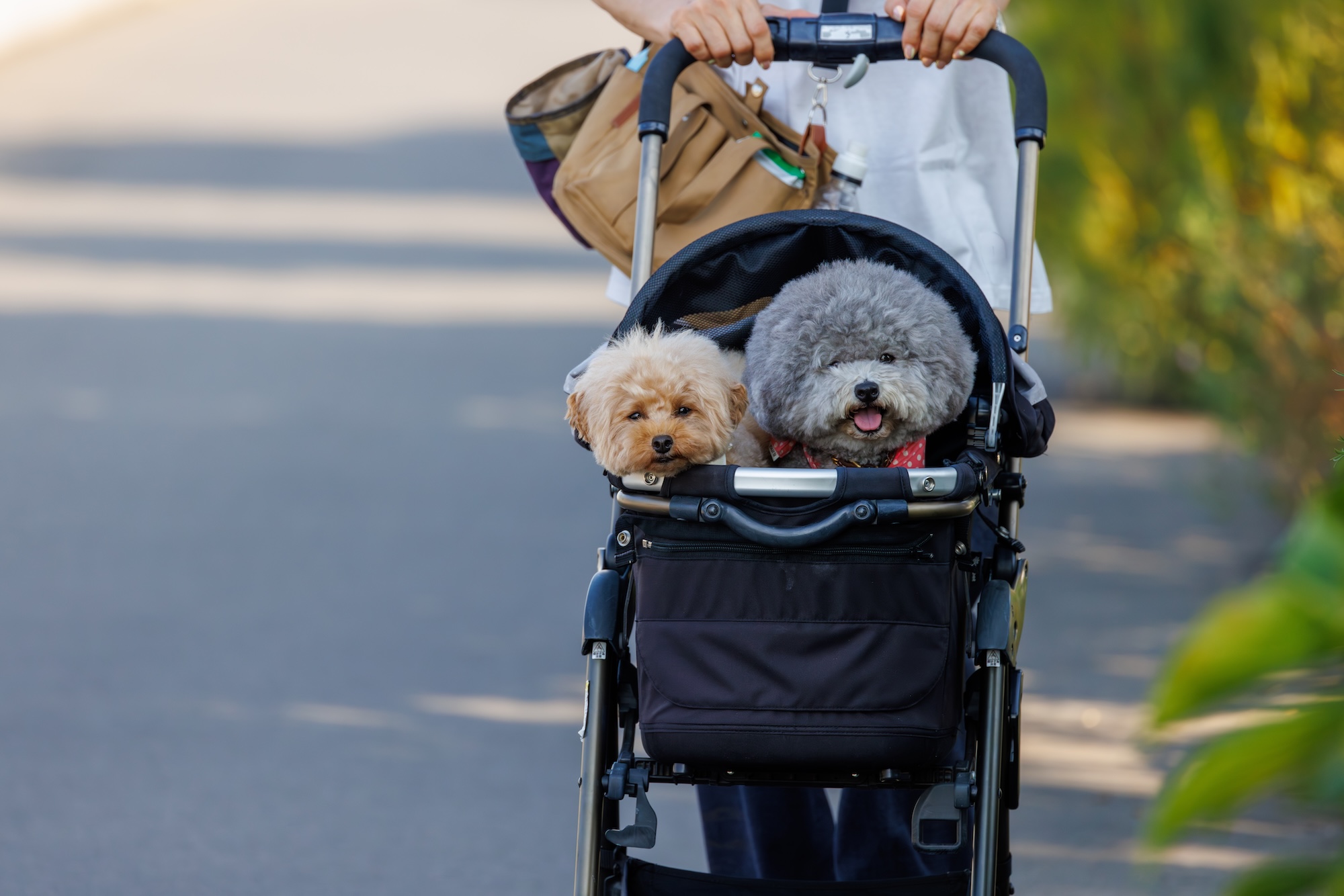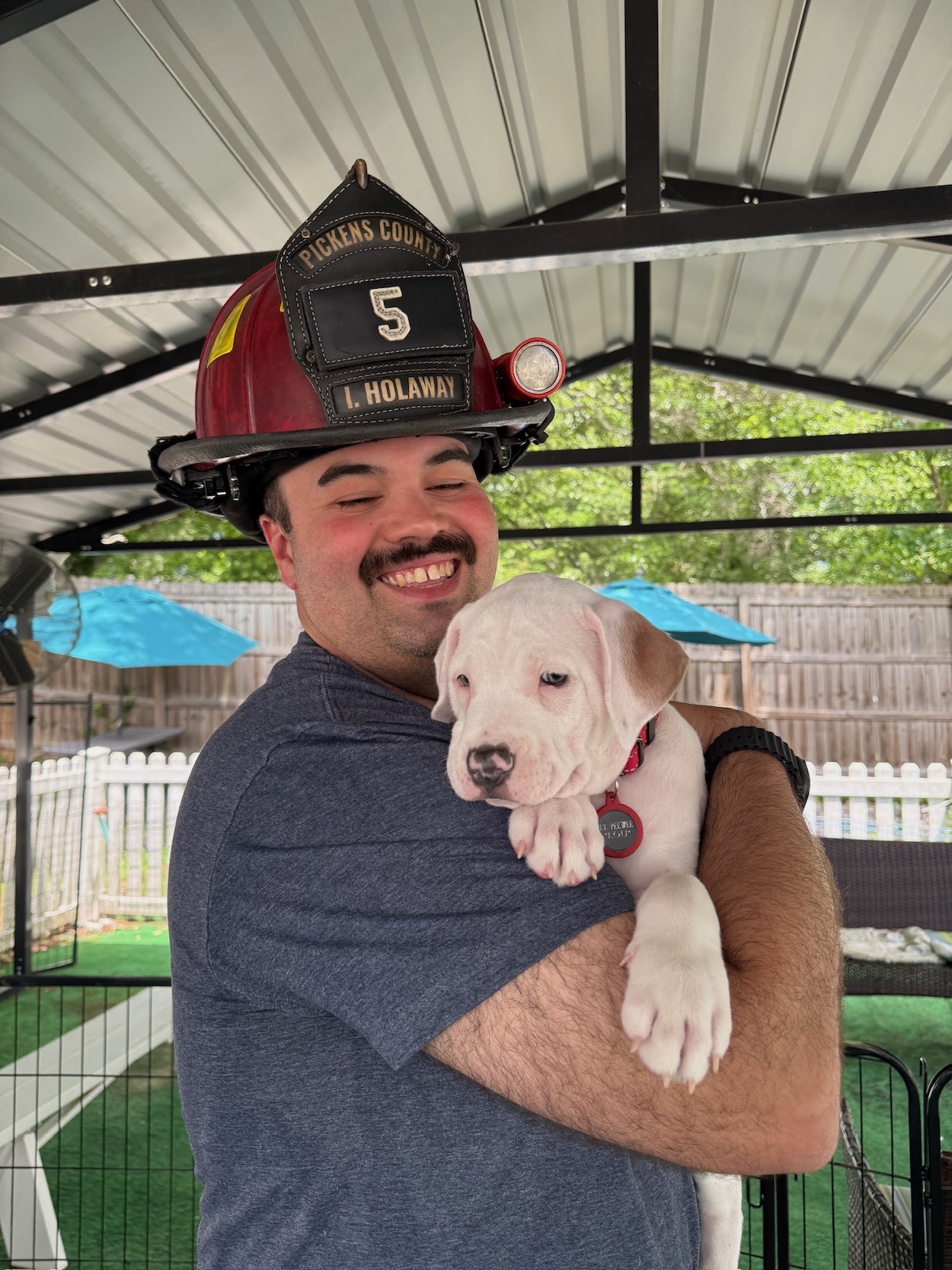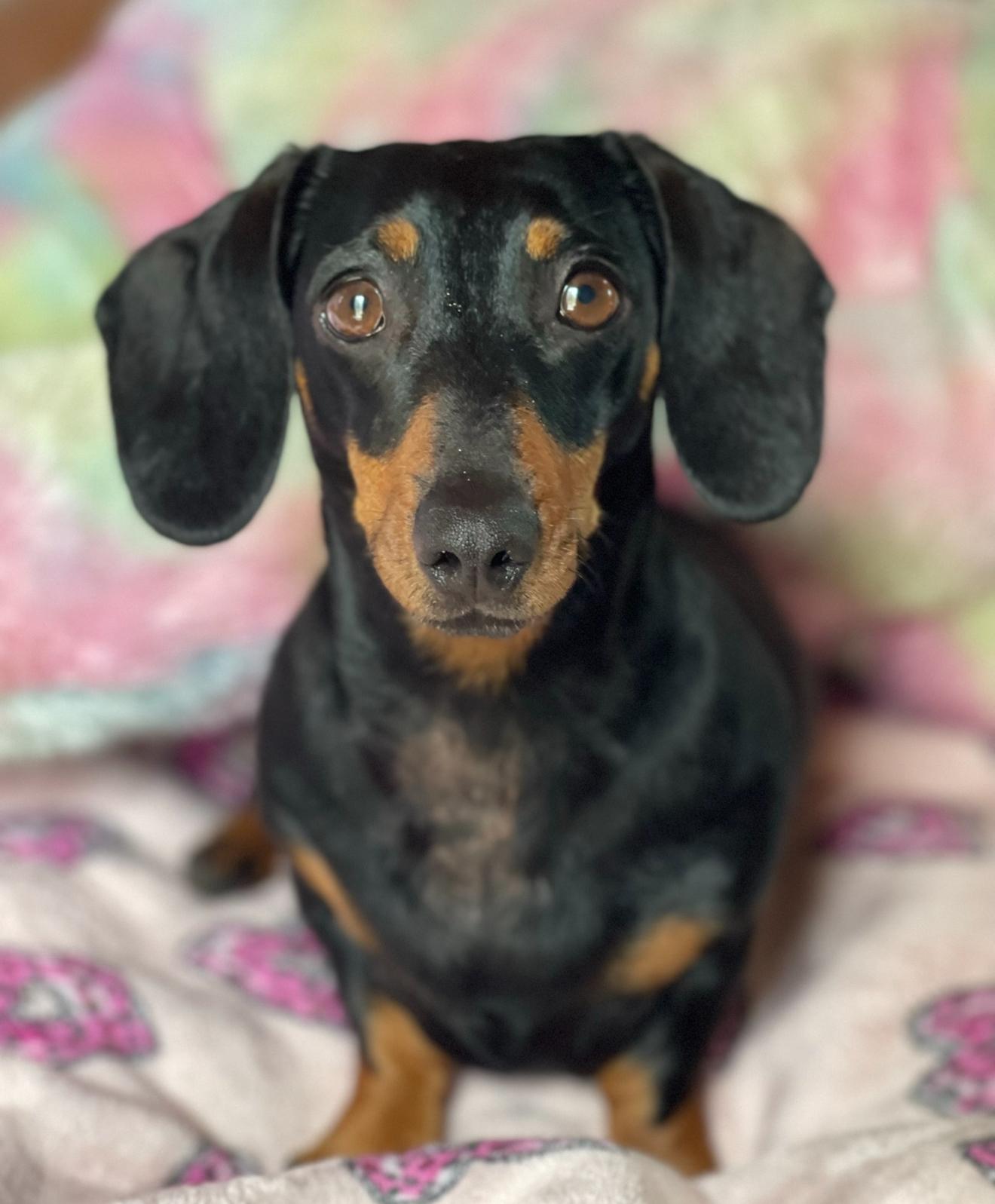Key points:
- The Fourth of July and the days immediately following are widely reported to be the most common times for dogs to go missing in the United States.
- Many dogs are scared of loud noises like fireworks. One study found that nearly a third of dogs had noise sensitivity.
- Fireworks themselves also contain substances that are highly hazardous to dogs.
- To protect your dog, keep them safely inside during fireworks displays.
- To help your dog get over a fear of fireworks, try a desensitization and counterconditioning protocol. This takes time and effort, but research has shown that it works—one study found that the method was 70% effective for dogs who were afraid of fireworks.
Independence Day may be a festive occasion for most American humans—but, thanks to the fireworks, it’s a difficult night for some dogs. It’s widely reported that July Fourth and the days immediately following are the most common time for dogs to go missing in the United States. This makes sense: 29% of dogs in a large Finnish study were fearful, and 32% had noise sensitivity. For those dogs, the unexplained loud noises that come with fireworks could be alarming. And there’s also the danger that fireworks pose if dogs come into contact with them or ingest them.
But if you take precautions, you can make it much more likely that you and your dog enjoy the holiday. Here’s what you can do to protect them.
Keep your dog away from fireworks displays
One of the simplest and most important strategies for preventing your dog from running away during fireworks is to keep them inside during the festivities.
When we spoke to psychologist and certified dog trainer Dr. Zazie Todd for an article about what to do if your dog is an escape artist, she recommended taking care of bathroom breaks before fireworks, and keeping your best friend inside until they’re over. “Make sure you’ve taken them for their walk,” she told us, “before the bangs begin.”
This type of management can be useful for all sorts of fears. If your dog is afraid of something and you can avoid it, there’s nothing wrong with adjusting your walking route or schedule to make things more comfortable for them.
Management can also include keeping your dog in a room of the house that’s further away from the fireworks, so the sound is quieter, or keeping a TV or radio on so the fireworks aren’t the only noises your dog hears.
And, of course, keeping your dog inside during fireworks reduces the chance that they touch or eat them. Fireworks contain substances that are extremely hazardous to dogs, and can sicken or even kill them. If you go out after the display is over, make sure the area doesn’t contain any used fireworks that your dog might get to. If your dog does ingest any part of a firework, call a veterinarian immediately.
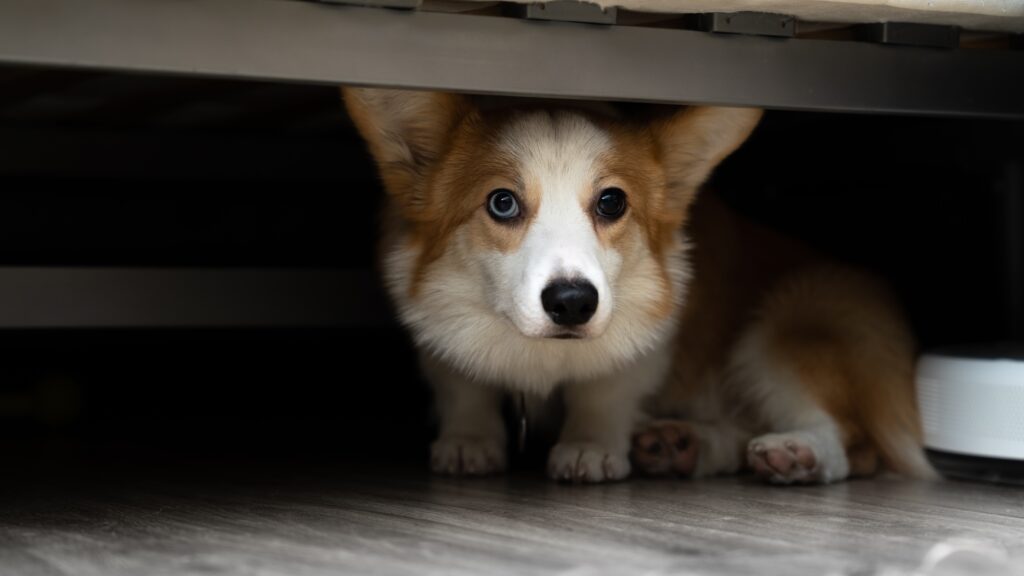
Use desensitization and counterconditioning
Keeping your dog away from the pyrotechnics is necessary—but, if they’re among those with a fear of fireworks, it may not be sufficient. On July Fourth, they’re likely to hear fireworks even if they’re safely indoors.
If you want to make it more likely that a fearful dog remains calm in your home during the fireworks, you can try a desensitization and counterconditioning protocol. This takes time and effort, but it tends to work: a 2020 study found counterconditioning more than 70% effective for dogs who feared fireworks.
We go into depth about how to use this technique in our article about how to help a fearful dog. The basic idea is that you’re presenting a stimulus at levels low enough that your dog is still happy to be around it (desensitization) and pairing it with things they like, such as tasty treats (counterconditioning).
This could mean playing the recorded sound of fireworks at a very low volume that doesn’t upset your dog at all, and pairing that stimulus with a treat. You can gradually increase the volume as long as your dog stays happy. But if they show any sign that they’re upset, stop and go back a step. Signs that a dog is afraid include a tucked tail, yawning, shaking, “whale eye” (wide eyes with the whites visible), ears pulled back, hiding, and freezing.
Desensitization and counterconditioning only work if the dog stays calm, happy, and able to learn—a condition that trainers call “under threshold.” Forcing a dog to “face their fear” will only make progress harder (plus, the dog will be upset). When she spoke to us for our article about helping a fearful dog, Maddie Messina, applied animal behaviorist and founder of Paws for Thought Dog Training in New York City, said: “Once [a dog is] over threshold, that thinking part of their brain is not really doing the majority of the work anymore.” She explained: “We need them to be cognizant of, ‘Oh, wait a minute, that thing that used to be scary to me—at this distance or intensity—it’s not that scary at this point.’”
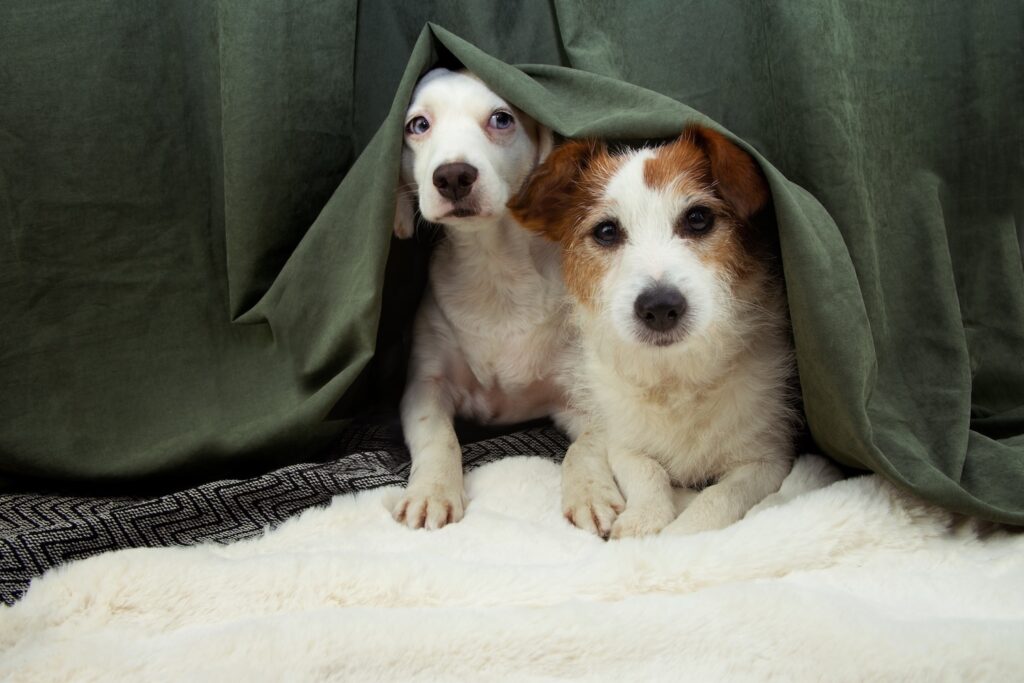
If your dog asks for comfort, go ahead and give it to them
While you should model calm behavior during fireworks, there’s no reason to ignore your dog if they are frightened and come to you for comfort.
The natural question here is why it’s okay to comfort a frightened dog if you don’t want your dog to be frightened. After all, trainers often advise dog owners not to reward behavior if they don’t want more of it—and this is sound advice. But fear is not a behavior; it’s an emotion. As such, if your dog asks you for attention during a difficult moment, you’re not going to do any harm by petting them and telling them they’ll be fine—as long as you don’t restrain them. In fact, you’ll send a message that they can count on you.
That doesn’t mean offering comfort is the beginning and end of your job, though. In that same article about helping fearful dogs, Denise Herman, founder and head trainer at Empire of the Dog in New York City, told us that it was best to incorporate desensitization and counterconditioning into the moment as well. “Throw some treats,” she recommended, “or get a favorite toy, or moderate the threshold that the scary thing is at… if it’s thunder, you wouldn’t sit by the window and comfort your dog. You wouldn’t keep the windows open. You would turn the TV on and retreat a little to an interior room so that they don’t have to experience it at a volume of 10.”
And, if your dog would rather ride out the display by themselves in a safe, comfy corner of your home, give them the space they want. In general, it’s a good idea to let your dog make choices as long as it’s safe to do so.
Consider other methods, and talk to your veterinarian
The same 2020 study that found more than 70% effectiveness for desensitization and counterconditioning found 44% effectiveness for anxiety wraps (garments intended to calm anxious dogs). Experts differ on how likely these are to help a dog, but most agree that they’re unlikely to do any harm. If you are going to introduce an anxiety wrap to your dog, do so gradually, associating it with positive experiences and treats—don’t put it on your dog for the first time when there are about to be loud fireworks. If your dog only wears such a garment when something loud and upsetting is about to happen, the act of putting it on might start to upset them.
If your dog’s fear is interfering with their quality of life or putting them in danger, talk to your veterinarian—dogs may show signs of fear, aggression, or stress if they’re in pain, and the vet can help identify or rule out medical issues.
Prepare so that, if your dog goes missing, it will be easier to find them
Make sure that your dog has a collar and a tag with proper ID on it any time you’re out, and if you’re at home during a time when they are likely to escape. But collars can pose a safety risk if left on an unsupervised dog—they can catch on crates, furniture, fences, or even another dog during play, potentially causing serious injury. To reduce this risk, remove standard collars when your dog is home alone, in a crate, or playing with other dogs.
You can consider microchipping your dog—a 2021 study found that dogs with microchips were much more likely to be returned to their owners than those without.
It’s also smart to have up-to-date photos of you and your dog together, in case you find them and someone questions whether they’re yours.
If your dog escapes, don’t panic—but start looking for them right away
Despite dog people’s best efforts, sometimes dogs do get loose. This is an incredibly scary situation—everyone who loves a dog has nightmares about it—but most lost dogs are found. A 2012 survey found that 14% of dog owners had lost their dogs over the previous five years—but 93% of them recovered their dogs.
If you can’t find your dog, start looking for them as soon as you can. Go to any place they know or like. Bring treats they love in case you need to lure them. Tell friends, neighbors, and anyone else in the area who might have seen them.
Put up paper fliers and post on social media and/or neighborhood message boards. Include a photo of your dog and advice about what to do if someone finds them.
Also check with local vet offices and shelters to see whether they’ve found your dog. Have the info from their tags or microchip ready so that you can confirm their and your identity.
Enjoy the holiday
We hold this truth to be self-evident: a safe, happy dog makes any Fourth of July celebration more fun and relaxing. For more tips about caring for your dog during the warmer months, check out our full Summer Guide.
